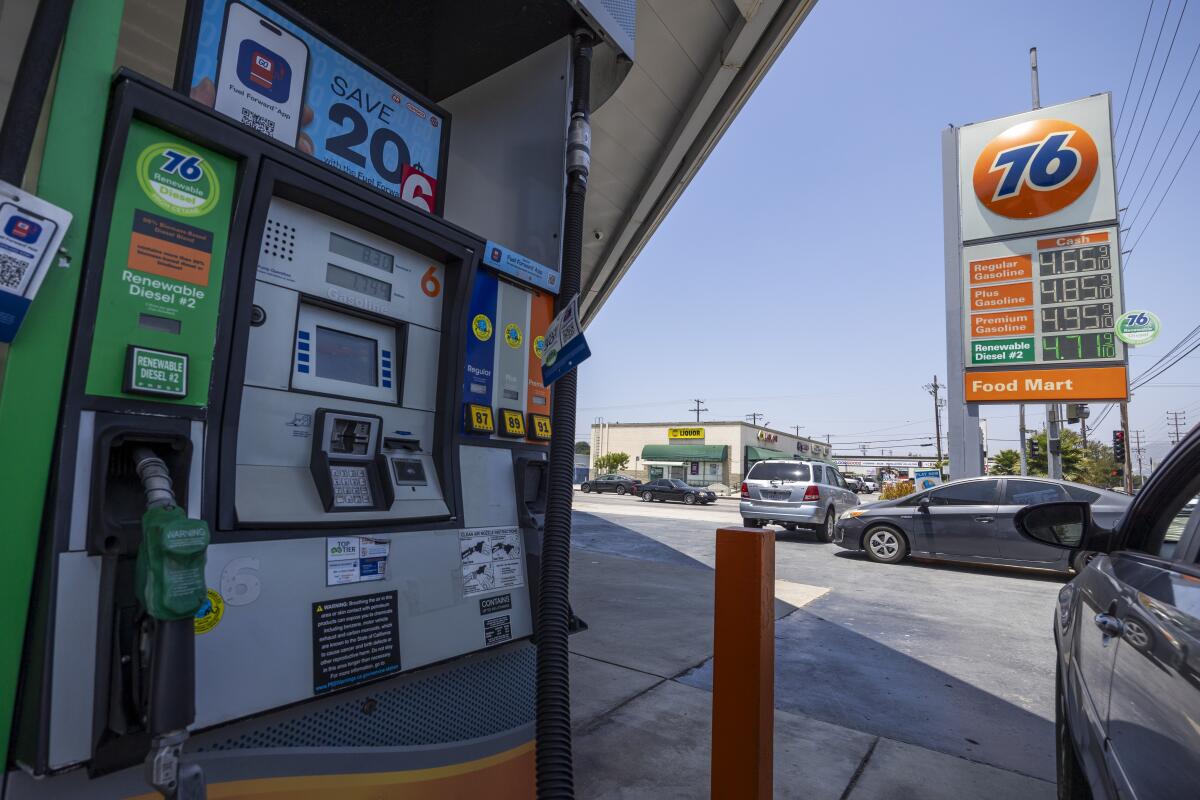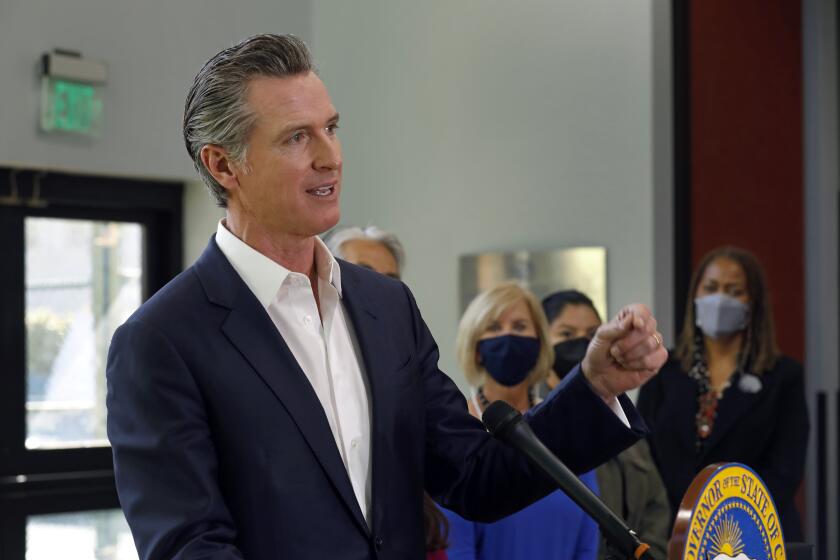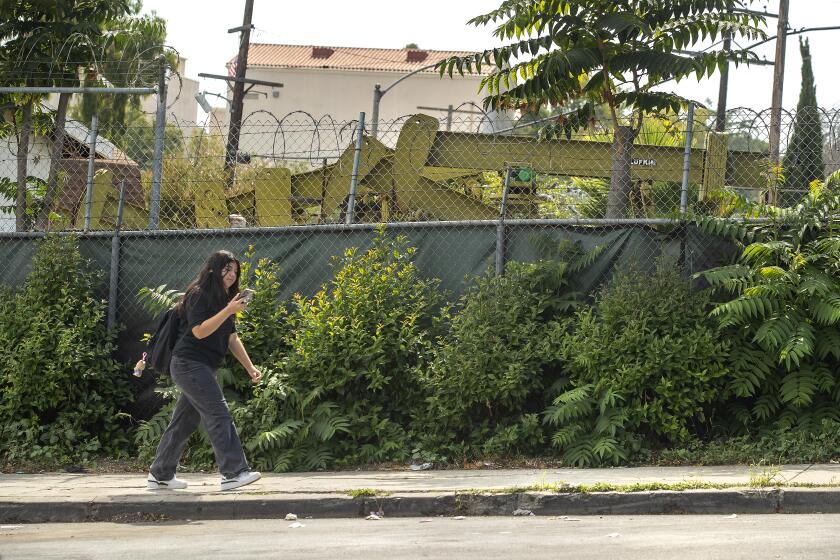Newsom calls for new oil refinery mandate in California

- Share via
SACRAMENTO — In the latest episode of his political fight with Big Oil, Gov. Gavin Newsom on Thursday called on California lawmakers to pass new requirements on oil refiners during the final two weeks of the legislative session.
Newsom’s last-minute proposal, his office said, would allow his administration to require that petroleum refiners maintain a stable inventory in order to prevent fuel shortages and price spikes when refinery equipment is taken offline for maintenance.
The plan marks a continuation of the governor’s campaign to blame the oil industry for high gas prices in California and another attempt by Newsom to jam legislation through the state Capitol. Newsom unveiled his proposal nearly two years after he announced a special session on oil prices that ultimately fell short of his call to cap the industry’s profits.
“Price spikes at the pump are profit spikes for Big Oil,” Newsom said in a statement. “Refiners should be required to plan ahead and backfill supplies to keep prices stable, instead of playing games to earn even more profits. By making refiners act responsibly and maintain a gas reserve, Californians would save money at the pump every year.”
California Gov. Gavin Newsom launched an offensive in his war with Big Oil. The battle didn’t go as planned.
After Democrats balked at the idea of penalizing the oil industry during the special session, lawmakers determined that state regulators needed more information about oil pricing in order to understand and stop price spikes at the pump.
Democratic legislators passed a law last year that established new transparency requirements for the oil industry and gave the California Energy Commission the power to set a profits cap and impose penalties through a regulatory process.
The law established the Division of Petroleum Market Oversight within the energy commission, and gave it the authority to gather new data from the industry in order to investigate price spikes. Earlier this year, the division wrote a letter recommending the state impose minimum inventory and resupply requirements for refiners based on its findings so far, arguing that the oil companies did not maintain enough refined gasoline to backfill production shortfalls or protect against the impact of unplanned maintenance.
“This lack of supply was foreseeable and preventable, but California’s refiners are not under a legal obligation to maintain sufficient supply to adequately protect Californians from price spikes,” the division reported.
Assembly Republican Leader James Gallagher (R-Yuba City) criticized the governor’s proposal as “a half-baked attempt to distract from that simple fact” that state policies are responsible for high gasoline costs.
“If Newsom was serious about bringing down prices, he would streamline the approval process for new gas storage projects, stop pushing new regulations that will add even more costs and make it easier to produce energy here in California,” Gallagher said in a statement. “Democrats have imposed the strictest regulations and highest gas taxes in the country - and that is all reflected in the price at the pump.”
So far, it’s unclear if Democratic lawmakers will get behind Newsom’s proposal or how they will respond to if a bill hoisted on them so late in the legislative process. The Legislature has about two weeks left to take action on hundreds of bills before they adjourn for the year at the end of August.
Newsom’s office said he discussed the plan with legislative leaders before making the announcement on Thursday. The proposal has not yet been introduced in a bill and was only summarized by the governor’s office in a press release.
An initiative funded by fossil fuel interests that sought to reverse California’s rules about how close oil wells could operate near homes and schools has been pulled from the November ballot.
“We are in ongoing discussions with the governor about his petroleum market’s oversight proposal,” said Nick Miller, a spokesperson for Assembly Speaker Robert Rivas (D-Hollister). “Those discussions as well as consultations with Assembly members, will continue.”
A spokesperson for Senate President Pro Tem Mike McGuire (D-Healdsburg) did not respond to a request for comment.
Newsom introduced the bill on the same day lawmakers followed through on their end of an agreement made with the oil industry to halt a campaign to overturn a law that prevents drilling new oil and gas wells within 3,200 feet of homes, schools, parks and hospitals.
The California Independent Petroleum Assn. and other proponents of the referendum campaign on the setbacks law agreed in late June to withdraw the measure from the November ballot.
As part of a compromise, Assemblyman Isaac Bryan (D-Los Angeles) said he agreed to limit the scope of another bill, AB 2716, that would have imposed a $10,000 penalty for each day that a “low production” oil well is operated within 3,200 feet of so-called “sensitive receptors.” Lawmakers officially amended the bill Thursday to only apply to the Inglewood oil field.
“As was agreed upon, we limited the scope of this bill to the largest urban oil field in the state that is directly in my district,” Bryan said. “It’s time for this oil field to pay a penalty for the harm it’s caused the surrounding communities and invest those funds in a sustainable future for the people who’ve lived around it.”
He said ensuring that the original setbacks law could go into effect immediately is the “most important environmental win that we could achieve all year.”
The Newsom administration introduced a budget trailer bill on Wednesday that would delay parts of the setbacks law and give oil companies until 2029 to submit plans for well-leak detection and response. The changes do not affect the prohibition on new permits for oil wells, which took effect after oil interests agreed to remove their referendum from the ballot.
H.D. Palmer, a spokesperson for the California Department of Finance, said the Newsom administration is asking lawmakers to delay the new leak-detection plans to give the state more time to implement that part of the law. Current staffing levels, he said, “are insufficient to make rapid progress on the implementation of SB 1137.”
“Delaying these deadlines is critical to ensuring the state has the time necessary to get these regulations right,” Palmer said in a statement. “However, while the specific leak detection and response plan regulations called for in the bill are developed, state agencies will continue to protect public health and safety around oil and gas sites. There are currently significant leak detection requirements in place that will remain in force.”
More to Read
Sign up for Essential California
The most important California stories and recommendations in your inbox every morning.
You may occasionally receive promotional content from the Los Angeles Times.
















